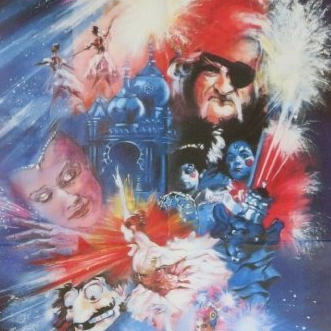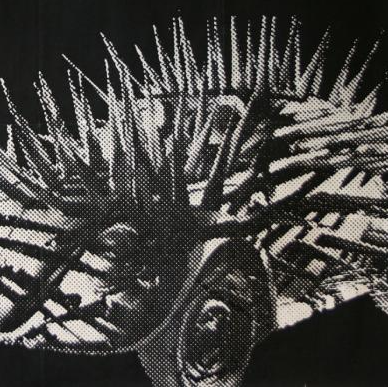Track 29
Nic Roeg and Dennis Potter team up to make pretty much the exact film you'd expect.

UK poster | Recorded Releasing
1988 — UK
Presented by HANDMADE FILMS
Cast: THERESA RUSSELL, GARY OLDMAN, COLLEEN CAMP, SANDRA BERNHARD, SEYMOUR CASSELL and CHRISTOPHER LLOYD
Director: NICOLAS ROEG
Producer: RICK McCALLUM
Executive Producers: GEORGE HARRISON and DENIS O'BRIEN
Screenplay and Original work by: DENNIS POTTER
Editor: TONY LAWSON
Cinematography: ALEX THOMSON
Production Designers: DAVID BROCKHURST and CURTIS SCHNELL
Art Directors: FRANCINE MERCADANTE and CURTIS SCHNELL
Costume Designer: SHAUNA HARWOOD
Music: STANLEY MYERS
© HandMade Films (1987) Partnership
Nicolas Roeg is frequently deemed amongst Britain’s greatest directors… in the ‘70s. Directing popular films such as Walkabout (1971), Don’t Look Now (1973) and The Man Who Fell to Earth (1976), amongst others, following from Bad Timing (1980), his star rather waned, though unlike the other bête noire of ‘70s British cinema, Ken Russell, he still got quite a bit of work from the big studios, most notably directing Saturday afternoon favourite The Witches (1990). No, really. Regardless, here we’re talking about Track 29, which is safely from the period when people didn’t really care about Roeg anymore.*
Track 29 is written by Dennis Potter and is somewhat of a reworking of something he did for Play for Today in 1974 entitled Schmoedipus. The original play seemingly is one of the ones that’s still known to exist, but for whatever reason doesn’t seem to be one that’s readily available despite being by Potter and numerous things claiming it to be one of the best PFTs. Potter denied that the film is based on the play, but it certainly uses the concept and seemingly even some scenes are recycled, even if how things play out appear rather different. As you might imagine from that one’s title, things are going to get incesty. Here, Theresa Russell is Linda, a bored mid-30s housewife in North Carolina. She lives a physically comfortable existence with her doctor husband, Henry (Christopher Lloyd), wanting for very little… materially. Her marriage is pretty much sexless; her husband seemingly caring only for his toy trains; and she yearns for a child that he’s apparently failing to give her. In reality, he’s having a kinky but not hot in the slightest affair with a nurse at the hospital (Sandra Bernhard), who caters to his desires in a way his wife either won’t or perhaps more likely whom he is unwilling to broach the subject with; suffice to say, he makes noises about leaving his wife to his mistress, but he’s unlikely to ever follow through. Anyway, Linda goes about her bored middle-class ‘80s housewife routine, when one day a hitchhiker (Gary Oldman) turns up in town looking for his birth mother. He follows her home; her great secret is that she was knocked up as a teenager by a carny (also Gary Oldman, conveniently), the baby ‘taken away’ from her. He insinuates himself into her life while her husband’s finding reasons not to spend time with her, turning into a perverse play at parenthood as he turns into a combination man-child and demon lover, with him eventually settling on doing away with her husband who threatens to divide her attention. Which man will she choose? Well, one of them isn’t real. It’s revealed rather early on that Linda is, as far as the outside world is concerned, having a psychotic break, apparently triggered by her meeting with the hitchhiker. Yet strange things do seem to be happening around the household. It all leads to a hauntingly ambiguous conclusion.
The film was apparently floating around for a little while prior to being made, written as part of Potter’s ill-fated dalliance with the American market in the early ‘80s (Schmoedipus was set in the London suburbs, rather than this film’s US setting). It was reportedly originally to be called ‘Tears Before Bedtime’, presumably the change from that is because it’s apparently not really a familiar idiom in America, with Joseph Losey attached to direct (it’d have been his first film to be made in America since ’51) and Vanessa Redgrave to star. It was also reportedly originally set in Texas rather than North Carolina; one assumes that this change was as it was cheaper and more convenient to use locations local to the Wilmington based studio than go further afield or try and pretend that coastal Carolina is the middle of Texas. Stuff happened and then Losey died in ’84. Instead we get this version directed by Roeg and starring his then wife/muse. It’s kind of surprising no one thought to pair Potter and Roeg before… or again, for that matter, though I suppose as this film failed at the box office and HandMade, pretty much the last bastion of this type of film in the UK at that point, went dormant a couple of years later, perhaps it isn’t.
While ‘Tears Before Bedtime’ and ‘Schmoedipus’ are pretty forthright, the new title is rather more ambiguous, wouldn’t you say? It’s a reference to ‘Chattanooga Choo Choo’: "'Pardon me, boy, is that the Chattanooga Choo Choo?' / 'Yes, yes, Track 29!'" (Lyrics by Mack Gordon, 1941). The song, for the unfamiliar, tells of a journey by train from Penn Station in New York to Chattanooga in Tennessee, where the singer’s sweet honey awaits and he’s going to profess his love, he’ll never roam, etc., etc. The homecoming element of the song and how it relates is fairly obvious, but it all harkens back to this idea of simpler, more wholesome times, if you ignore the fact that it was the ‘40s and there was a war on, but that didn’t hit America for like another six or seven months so who gives a shit, y’know? Symbolism, what, what. Politicians in the ‘80s were all about harkening back to a perceived and imagined golden age; nostalgia for a version of the country that never truly was. The liner notes to Track 29 pithily note that Penn Station does not and has never had 29 tracks. Henry’s love of toy trains leads to him delivering a key note speech at a enthusiasts’ convention, his waxing lyrical about an age of innocence to which we want to and should return morphing into the rhythms of a political rally, even as neither he nor the surrounding are living up to the ideals he’s espousing. Neither indeed does the past. There is no track 29. His wife was molested behind the bumper cars twenty years ago.
Despite the overwhelming darkness of its themes, the film is ultimately intended to be in, many ways, a comedy. I’m not speculating here; both Potter and Russell stated as such. Comedy and tragedy are two halves of the same and all that. The presentation of the loveless marriage, the affair, the ill-conceived nostalgia, the false appeal of childhood ‘innocence’, they’re all done in a way to elicit blackly comic amusement, even as the heart of the story remains quite horrific. The broader political angle of the film is, as far as I can tell, a fresh addition that wasn’t in the play, which was focussed a lot more on just the secrets behind closed doors type stuff, along with some stuff about gender roles that doesn’t seem to have quite made the transition (Elizabeth (Linda’s counterpart) is in essence the mother of her man-child husband). The past is perhaps not something you want to come back, as Linda is menaced by her maybe long-lost child, who becomes (and thus she becomes) more deranged as time goes on. The reveal of the ‘twist’ so early in the film is quite genius; many a lesser film would pull the ‘it’s all in her head’ card as the big reveal at the end, expecting people to be shocked when it’d be quite the most obvious twist imaginable. Here, it gets it out of the way quite offhandedly at the midpoint, allowing the viewer to focus on what’s really going on. That’s perhaps a misleading turn of phrase, given the intermingling of fantasy and reality and the increasingly blurred line between them in the film. Even then, much is left unsaid.
* I’m never terribly clear on whether
Bad Timing was one of the ones that was disregarded at the time. Regardless, Roeg’s work in the ‘80s has seen varying degrees of reappraisal and I guess people like it now, or some of it at any rate. Haven’t seen much in the way of doing later stuff however. Frankly I liked
Puffball (2007) though. I should probably do a post on it.
At time of writing, Track 29 isn't even listed on JustWatch and doesn't appear to be on any major streaming service. Sorry, kids. Alternatively, physical copies are reportedly available for rent via Cinema Paradiso.
Despite the number on that poster up top, the film is in fact an 18 and does not appear to have ever been lower; the BBFC's info reporting "strong violence, sex and incest theme". As that does seem to be the only UK quad I've been able to find, I'm guessing they printed a load casually expecting a lower rating… for some reason.



